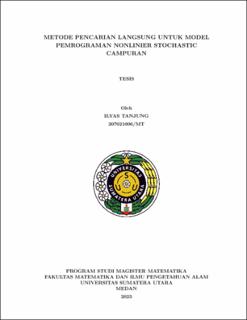Metode Pencarian Langsung untuk Model Pemrograman Nonlinier Stochastic Campuran
Direct Search Method for Mixed Stochastic Nonlinear Programming Models

Date
2023Author
Tanjung, Ilyas
Advisor(s)
Mawengkang, Herman
Sawaluddin
Metadata
Show full item recordAbstract
Stochastic programming is a tool for optimal planning and decision making in
the presence of uncertainty in the data. The type of study object is a random
optimization problem where the results (outcomes) of random data are not re-
vealed at run time, and the decisions to be optimized do not have to anticipate
future results. This provides a close link to the ”real time” optimization required
for optimal decisions ”here and now” in an uncertain data environment. In this
research, a new approach is proposed to obtain global optimization of nonlinear
mixed-count stochastic programming problem models. The research focuses on
two-stage stochastic problems with non-linearity in the objective function and con-
straints. The variables in the first stage have a whole value while the variables in
the second stage are a mixture of whole and continuous. Problems are formulated
using scenario-based representation. The basic idea for solving this non-linear
mixed-mixed stochastic programming problem is to transform the model into an
equivalent model in the form of a deterministic non-linear mixed-mixed program.
This is possible because the uncertainties, which are assumed to be discrete in
distribution, can be modeled as a finite number of scenarios. However, the size
of the equivalent model will grow rapidly as a consequence of the number of sce-
narios and the number of time horizons. The concept of filtered probability space
combined with data mining will be used to create scenarios. The approach used to
solve large-scale non-linear mixed-count programs is to lift the value of the non-
basis variable from its boundaries so as to force a base variable to have a count
value. Then the reduced problem is processed in which the calculated variables are
kept constant and changes are made to these variables in discrete steps to obtain
a global optimal solution.
Collections
- Master Theses [423]
